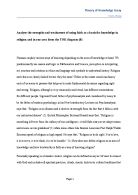The motives for belief in ‘God’ are as varied as the number of religions itself. Some need safety and security in an ever changing world while some seek refuge in the concepts of everlasting eternity out of fear of death. Following a neatly laid out doctrine of dos and don’ts relieves one from the laborious task of critical thinking. Reason and faith are related in that reason is belief with adequate evidence while belief lacks conclusive evidence. Since most of us are so heavy on reason in our everyday lives, maybe there is a dualistic tendency to believe in the other side too. Some psychologists even say that humans are born to believe in God and that this instinct is hard-wired in the brain because it gives us a better chance of survival (3).
Whatever the motive, since one is dealing with spiritual concepts and identities of the supernatural world, one cannot use perception, reason or logic as ways of knowing. The predominant way of feeling HIS presence is faith combined with intuition and emotion. Since time immemorial, man has been trying to concretely justify and prove the existence of god but all proofs crumble away. Eventually, one is left with one’s own individual faith in the matter at hand. Faith is the only way of knowing that allows the knower the freedom to believe in an area of knowledge without searching for conclusive proofs or rational evidence. One is free to believe whatever one thinks is worthy of believing. Famous Lebanese Poet Khalil Gibran once said that, “Faith is knowledge within the heart, beyond the reach of proof” (4). But one has to ask: Is faith an accurate way of knowing? Does it provide one with correct spiritual knowledge?
Maybe in the future, humans will learn how to tap into parts of the brain that connect directly with this supreme consciousness; one will receive spiritual knowledge straight from the source, like Jesus and Prophet Mohammed did. When that day arrives, then maybe, faith can be dropped and perception would be the new tool to understand god. But till that day, faith is the only way of knowing for religion since the identity of god is not only unverifiable but also beyond the limits of thought itself. However, there have been many who have put immense energy in trying to construct logic arguments and convoluted proofs over the years. One of the best proofs for the existence of god came from 17th Century Philosopher who argued that God is too grand a concept for a petty human being to imagine and such a conception must have been planted in man’s brain by god himself, hence God must surely exist (5). Regardless of whether god really exists or not, the conception of an all-knowing, infinitely benevolent, and supremely loving god is itself very soothing and even alleviates pain (6). In that sense, faith, as a way of knowing, is not really concerned with the veracity of religion, as an area of knowledge, but in achievement of a relaxing and nourishing effect on the knower. Looking at the bigger picture, isn’t all knowledge subjective on the relationship the knower has with the area of knowledge and the way of knowing?
In many cases, seers and ancient sages have said that the first step, although counter-intuitive, is to have faith and only then will one be able to feel HIS presence. St. Augustine, once said that, “Faith is to believe what you do not see; the reward of this faith is to see what you believe” (7). However, one would ask, “What if one never sees the object of belief or feels the divine presence, in spite of how strong one’s belief is?”
The biggest weakness of using faith as a tool for religious knowledge is that there is no guarantee of the intended goal. Some proclaim that the stronger the faith, the higher the likelihood that one will experience the supernatural. Some say, that the intensity of faith doesn’t matter, it is matter of divine grace. Either way, the uncertainty in the success of gaining spiritual knowledge is faith’s biggest downfall.
Natural Science, on the other hand, uses sense perception and inductive reasoning to derive laws and prove complex hypotheses. Inductive logic is the process of deriving general principles from specific instances and observations. Inductive logic is different from faith in that, inductive logic is based upon ‘statistical probabilities’ while faith implies that there is no real reason other than emotional or intuitive tendencies (8). The scientific community scoffs at the idea of using faith and considers it as counter-intuitive since scientific hypotheses and laws are verifiable by repeated trials under uniform experimental conditions. There is no need to have faith in anything; in fact, such ‘faith’ in a particular hypothesis not only generates bias but also breaks the ‘objectivity’ rule of scientific attitude (9). In that sense, faith is superfluous in the rigors of scientific pursuit.
On a different note, golden rule #1 of the list of scientific attitudes states that a scientist believes everything that happens in this world has a cause or reason (9). Isn’t this faith wrapped in a different cloak? Science seeks firmness of principle but scientists are sceptical and rather hesitant in changing traditional principles when the evidence points in a different direction. In some cases, scientists even fabricate data in order to strengthen their hypotheses. The most famous case of such a scandal in recent times was that of Professor. Hwang Woo Suk, who allegedly faked two landmark pieces of research into cloning human stem cells (10). Isn’t this stubbornness to validate hypothesis a type of ardent faith?
The same ardent faith that would have brought divine grace to the spiritual seeker’s path caused the downfall of the nation’s top scientist. It seems that small amount of faith is necessary in knowledge acquisition in most areas of knowledge like the faith in the veracity of language in history or faith in mathematical symbols, but one should be conscientious enough to balance this faith with a good dose of reason. As Pope John Paul II said, “Faith and Reason are like two wings on which the human spirit rises to the contemplation of truth” (11).
Word Count: 1421
References
"What Is Religion? Definitions and Quotes – Religion Facts." Religion, World Religions, Comparative Religion - Just the Facts on the World's Religions. Web. 12 Feb. 2012. < >
"Major Religions Ranked by Size." World Religions Religion Statistics Geography Church Statistics. Web. 12 Feb. 2012. < >
"Why We Are Born to Believe in God: It's Wired into the Brain, Says Psychologist | Mail Online." Home | Mail Online. Web. 12 Feb. 2012. < >
"Faith Is Knowledge Within... at Brainy Quote." Famous Quotes at BrainyQuote. Web. 12 Feb. 2012. < >
"Descartes' Proof for the Existence of God." Oregon State University. Web. 12 Feb. 2012. < >
"Religion: Why Do People Believe in God? - Telegraph." Telegraph.co.uk - Telegraph Online, Daily Telegraph, Sunday Telegraph - Telegraph. Web. 12 Feb. 2012. < >
"Faith Is to Believe What You... at BrainyQuote." Famous Quotes at BrainyQuote. Web. 12 Feb. 2012. < >
"Inductive Reasoning vs. Faith." Reasonable Soup. Web. 12 Feb. 2012. < >
"Scientific Attitudes That Are Qualities of Scientists." Jessica Webber on Hub Pages. Web. 12 Feb. 2012. < >
"BBC NEWS | Asia-Pacific | Profile: Hwang Woo-suk." BBC News - Home. Web. 12 Feb. 2012. < >
Revelation, This. "Fides Et Ratio - John Paul II - Encyclical Letter (September 15, 1998)." Vatican: The Holy See. Web. 12 Feb. 2012. < >







